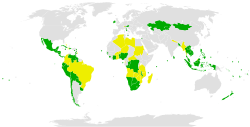
Back معاهدة حظر الأسلحة النووية Arabic Nüvə Silahlarının Qadağası Müqaviləsi Azerbaijani Дагавор аб забароне ядзернай зброі Byelorussian Tractat sobre la prohibició de les armes nuclears Catalan Smlouva o zákazu jaderných zbraní Czech Atomwaffenverbotsvertrag German Traktato pri abolo de nukleaj armiloj Esperanto Tratado sobre la Prohibición de las Armas Nucleares Spanish پیمان منع جنگافزار هستهای Persian Ydinaseiden kieltosopimus Finnish
| Treaty on the Prohibition of Nuclear Weapons | |
|---|---|
 Parties Signatories | |
| Type | Arms control, nuclear disarmament |
| Signed | 20 September 2017[1] |
| Location | New York, U.S. |
| Sealed | 7 July 2017 |
| Effective | 22 January 2021[2] |
| Condition | 90 days after the fiftieth instrument of ratification, acceptance, approval or accession has been deposited |
| Signatories | 94[1] |
| Parties | 73[1] (complete list) |
| Depositary | United Nations Secretary-General |
| Languages | Arabic, Chinese, English, French, Russian and Spanish |
| Full text | |
The Treaty on the Prohibition of Nuclear Weapons (TPNW), or the Nuclear Weapon Ban Treaty, is the first legally binding international agreement to comprehensively prohibit nuclear weapons with the ultimate goal being their total elimination. It was adopted on 7 July 2017, opened for signature on 20 September 2017, and entered into force on 22 January 2021.[3][4][5][6]
For those nations that are party to it, the treaty prohibits the development, testing, production, stockpiling, stationing, transfer, use and threat of use of nuclear weapons, as well as assistance and encouragement to the prohibited activities. For nuclear-armed states joining the treaty, it provides for a time-bound framework for negotiations leading to the verified and irreversible elimination of its nuclear weapons programme.
A mandate adopted by the United Nations General Assembly on 23 December 2016 scheduled two sessions for negotiations: 27 to 31 March and 15 June to 7 July 2017.[7] The treaty passed on schedule on 7 July with 122 in favour, 1 against (Netherlands), and 1 official abstention (Singapore). Sixty-nine nations did not vote, among them all of the nuclear weapon states and all NATO members except the Netherlands.[8]
- ^ a b c "Chapter XXVI: Disarmament – No. 9 Treaty on the Prohibition of Nuclear Weapons". United Nations Treaty Collection. 24 September 2024. Retrieved 25 September 2024.
- ^ "UN Secretary-General's Spokesman - on the occasion of the 50th ratification of the Treaty on the Prohibition of Nuclear Weapons". United Nations. 24 October 2020. Retrieved 25 October 2020.
- ^ "Treaty banning nuclear weapons approved at UN: Supporters hail step towards nuclear free world as treaty is backed by 122 countries". The Guardian. 7 July 2017. Retrieved 9 August 2017.
- ^ Gladstone, Rick (7 July 2017). "A Treaty Is Reached to Ban Nuclear Arms. Now Comes the Hard Part". The New York Times. Retrieved 9 August 2017.
- ^ Hawkins, Dimity (25 October 2020). "Now that nuclear weapons are illegal, the Pacific demands truth on decades of testing | Dimity Hawkins". the Guardian. Retrieved 25 October 2020.
- ^ "UN: Nuclear weapons ban treaty to enter into force". AP NEWS. 24 October 2020. Retrieved 25 October 2020.
- ^ UN General Assembly approves historic resolution Archived 10 September 2019 at the Wayback Machine, ICAN, 23 December 2016
- ^ "United Nations Conference to Negotiate a Legally Binding Instrument to Prohibit Nuclear Weapons, Leading Towards their Total Elimination, 27 April to 22 May 2016". www.un.org. Retrieved 7 July 2017.